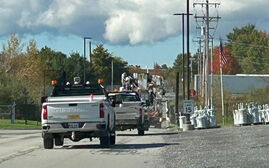LUPC staff recommends CMP transmission line approval
Another regulatory hurdle for Central Maine Power Co.'s plan for a $1 billion transmission line through western Maine may soon be cleared, after the Land Use Planning Commission staff, in a draft memo, said the line is an allowed use and meets land use standards.
The LUPC, which is in charge of the land in the unorganized territories, will continue deliberations on the site review for the 145-mile transmission corridor through Franklin and Somerset counties Wednesday. The New England Clean Energy Connect plan requires LUPC approval before it can get permits from the Maine Department of Environmental Protection, and also must be approved by the U.S. Army Corps of Engineers.
The 41-page memo, released Monday, concludes that the line is an allowed use for the subdistricts it will go through, including the Kennebec River and Appalachian Trail, and that it also "complies with all applicable land use standards, with conditions related to the public health, safety and general welfare; and traffic." The conclusions come with conditions, and may be redrawn once the LUPC deliberates, the memo says.
The proposed line would extend from the Quebec-Maine border in Franklin County to Lewiston, where it would connect with the existing electric grid. Once completed, it would deliver 1,200 megawatts of energy generated by Hydro-Quebec to Massachusetts. The commission began taking comments and gathering other information about the proposal in October 2017.
The plan has been strongly opposed by environmental groups and many towns in the region the line would go through. The group Say No to NECEC, in a news release, said it's "extremely disappointed in the LUPC staff's recommendation."
The recommendation "devalues the importance of preserving Maine's natural, scenic, and recreational resources of the Kennebec River and National Scenic Appalachian Trail in particular, which are the focus of this permit review," said Sandi Howard, director of the group, as well as co-leader of the No CMP Corridor referendum initiative, which must gather 60,000 signatures by Feb. 3 to put the transmission line plan on the November ballot.
Conclusions by LUPC staff
The conclusions in the draft are that the propsal:
- Is an allowed use in the General Development, Residential Development, General Management, Flood Prone Protection, Fish and Wildlife Protection, Great Pond Protection and Shoreland Protection subdistricts.
- Is an allowed use in the Recreation Protection subdistricts, provided CMP installs and maintains vegetative plantings described in the company's “Joe’s Hole (Moxie Pond) Planting Plan,” which calls for plantings in the Appalachian Trail area to shield it from view of the traill.
- Is an allowed use in the Wetland Protection subdistrict provided CMP complies with its proposed Post-Construction Vegetation Maintenance Plan.
- Complies with all applicable sections of the LUPC's land use standards, provided CMP secures necessary approvals from the Maine Department of Transportation, Franklin County and Somerset County for materials transport during and following construction; and submits, before construction, written agreements with state, local or private emergency services providers to ensure fire and emergency services are available at all times and at all locations within the commission's jurisdiction.
Appalachian Trail, Kennebec River crossings
The plan initially called for crossings in three areas that are protected for recreation use [P-RR subdistricts] — the Appalachian Trail, Beattie Pond and the Kennebec River. The commission can approve the use in those areas if it finds there's no alternative site, the line can be buffered to minimize impact, or the commission can impose other conditions to minimize impact.
CMP, after the September LUPC meeting on the project, redrew 53 miles of the plan to go below Beattie Pond through Merrill Strip Township, negotiating with the landowner of the new path.
The Kennebec River crossing, which is between Moxie Gore and West Forks, will be put underground, which the commission said in the memo would be the best alternative.
Installing the line underground along 3,500 feet of the Appalachian Trail, however, would be more disruptive, and the commission staff agreed with CMP's conclusion that keeping it above ground is the best alternative.
CMP provides an easement to the National Park Service for the trail, and CMP said that any relocation of the line would still have to cross the trail. The line is also going to be "co-located" with an existing line, although the new line is much larger, the memo says. It was determined that putting the line underground would cost $29.8 million.
"Overall, as compared to the proposed overhead transmission line, undergrounding at the Appalachian Trail P-RR subdistrict would necessitate the use of more heavy equipment, longer construction time, greater disruption to traffic, additional temporary environmental impacts, construction of permanent access roads and higher construction costs," the memo says. "The commission finds that, on balance, the benefit to recreational users on the Appalachian Trail of undergrounding the transmission line does not outweigh the environmental, technological, logistical, and financial implications of using this methodology in the Appalachian Trail P-RR subdistrict."
Mainebiz web partners
How does destroying Maine habitats benefit Maine when the electricity is going from Quebec to Mass?? It is not more electricity for Maine so our rates will go down. It may bring jobs, but I doubt very highly that they will be filled with Maine workers. The workers will be coming from out of state. So again, how does this benefit Maine? They keep saying in commercials how this benefits us, but as far as I can tell, what they say in the commercials is not true. It may be what they hope will happen, but it won't actually happen they way the commercials say it will. We will destroy Maine land for nothing that helps Maine people. This should be decided on by the Maine people, not by the government or commissions.













1 Comments